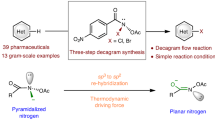Abstract
THE hydroxylation of aromatic compounds in vivo is well known1, and polycyclic aromatic hydrocarbons2 and aromatic amino-acids and related compounds3 have been found to be hydroxylated by suitably fortified suspensions of rodent liver microsomes. Aromatic amino-acids and related compounds are also hydroxylated non-enzymically in phosphate buffer solutions containing iron and ascorbic acid in the presence of oxygen4,5, or in hydrogen peroxide solutions containing Fe++ (ref. 6). In the case of polycyclic aromatic hydrocarbons slow conversion to quinones, by ascorbic acid7, and more rapid oxidation by hydrogen peroxide8, have been reported.
This is a preview of subscription content, access via your institution
Access options
Subscribe to this journal
Receive 51 print issues and online access
$199.00 per year
only $3.90 per issue
Buy this article
- Purchase on Springer Link
- Instant access to full article PDF
Prices may be subject to local taxes which are calculated during checkout
Similar content being viewed by others
References
Parke, D. V., and Williams, R. T., Ann. Rep. Chem. Soc., 55, 376 (1959).
Conney, A. H., Miller, E. C., and Miller, J. A., J. Biol. Chem., 288, 753 (1957).
Mitoma, C., Posner, H. S., Reitz, H. C., and Udenfriend, S., Arch. Biochem. Biophys., 61, 431 (1956).
Udenfriend, S., Clark, C. T., Axelrod, J., and Brodie, B. B., J. Biol. Chem., 208, 731 (1954).
Dalgliesh, C. E., Arch. Biochem. Biophys., 58, 214 (1955).
Raper, H. S., Biochem. J., 26, 2000 (1932).
Warren, F. L., Biochem. J., 37, 338 (1943).
Calcutt, G., Brit. J. Cancer, 4, 254 (1950).
Harper, K. H., Brit. J. Cancer, 13, 732 (1959).
Mazelis, M., Nature, 189, 305 (1961).
Baldwin, E., Dynamic Aspects of Biochemistry, third ed., 160 (Camb. Univ. Press, 1959).
Openheimer, C., and Stern, K. G., Biological Oxidation, 67 (W. Junk, The Hague, 1939).
Emeléus, H. J., and Anderson, J. S., Modern Aspects of Inorganic Chemistry, second ed., 178 (Routledge and Kegan Paul, London, 1952).
Emeléus, H. J., and Anderson, J. S., Modern Aspects of Inorganic Chemistry, second ed., 183 (Routledge and Kegan Paul, London, 1952).
Harper, K. H., Brit. J. Cancer, 11, 499 (1957).
Norman, R. O. C., Thompson, G. A., and Waters, W. A., J. Chem. Soc., 175 (1958).
Friedel, R. A., and Orchin, M., Ultra-violet Spectra of Aromatic Compounds (Chapman and Hall, London, 1951).
Author information
Authors and Affiliations
Rights and permissions
About this article
Cite this article
DEWHURST, F., CALCUTT, G. Non-Enzymic Hydroxylation of Polycyclic Aromatic Hydrocarbons. Nature 191, 808–809 (1961). https://doi.org/10.1038/191808a0
Issue Date:
DOI: https://doi.org/10.1038/191808a0
This article is cited by
-
Non-Enzymatic Hydroxylation of Aromatic Compounds
Nature (1963)
-
Non-Enzymatic Hydroxylation of Aromatic Compounds
Nature (1962)
Comments
By submitting a comment you agree to abide by our Terms and Community Guidelines. If you find something abusive or that does not comply with our terms or guidelines please flag it as inappropriate.


